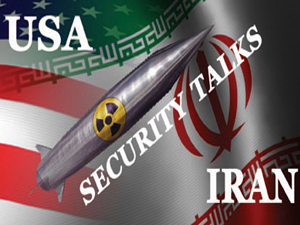JIM.LOBE

WASHINGTON (IPS) – Iran’s announced intention to build 10 new nuclear enrichment plants has been deemed “unacceptable” by the administration of President Barack Obama, which warned of increased pressure on Tehran if it does not soon accept Western proposals to curb its nuclear program.
The contretemps, which came amid reports that Tehran had arrested five British nationals whose sailboat strayed into Iran’s territorial waters, was the latest indication that tensions between Iran and the United States and its Western European allies are escalating rapidly.
And although independent experts described Iran’s plans, announced Nov. 29 by President Mahmoud Ahmadinejad, as wildly improbable, they also agreed that the announcement itself would bolster hardliners in Israel and the West who favor confrontation over diplomacy.
Indeed, the neo-conservative editorial board at the Wall Street Journal Nov. 30 jumped on Mr. Ahmadinejad’s announcement to argue for a much tougher line, even “military strikes,” against Iran.
“(U)ntil the President, his advisers and the Europeans realize that only punitive sanctions or military strikes will force (Iran) to reconsider its nuclear ambitions, an emboldened Islamic Republic will continue to march confidently toward a bomb over the wreck of … Barack Obama’s best intentions,” the Journal wrote.
Mr. Ahmadinejad’s announcement came in response to Nov. 27 approval by the 35 governors, including the representatives of Russia and China, of the International Atomic Energy Agency (IAEA) in Vienna of a Western-sponsored resolution demanding a halt to all work on a yet-to-be-completed nuclear enrichment plant near Qom.
Iran reported the existence of the Qom plant to the IAEA in late September. But the Western powers claimed that Tehran should have given notice that it planned to build such a plant much earlier, pursuant to IAEA rules that Iran insists it was no longer bound by.
Iran’s initial report about the Qom plant came on the eve of the first and thus far only round of high-level talks between it and the so-called P5+1–the five permanent members of the UN Security Council plus Germany–on Tehran’s nuclear program.
While all the parties reportedly agreed in principle on a plan to ship about 75 percent of Iran’s existing stockpile of low-enriched uranium for reprocessing in Russia and France to levels that could be used for the production of medical isotopes, Iran has subsequently balked at the specific terms by which the accord would be carried out.
Tehran’s failure so far to offer a definitive yes or no–or even to schedule a follow-up meeting–is widely seen as a reflection of an intensifying power struggle between more moderate and hardline factions in the regime in the wake of last June’s contested elections.
Mr. Ahmadinejad’s announcement that Iran intends to build 10 more nuclear plants of the same scale as its Natanz facility is also seen as part of that struggle, particularly because he initially appeared to favor the accord. Iran’s parliament urged the government to reassess its cooperation with the IAEA, while hardline lawmakers called for Tehran to abandon the nuclear Non-Proliferation Treaty altogether.
Declared parliamentary speaker Ali Larijani, a key hardliner and long-time adviser to Iran’s leader, Ayatollah Ali Khamenei: “The West is at a crossroads. Either they accept our nuclear program, or Iran will use its own capabilities.”
Washington’s initial reaction to Ahmadinejad’s announcement was relatively restrained. But Washington’s UN ambassador, Susan Rice, seemed to harden the administration’s position, calling the announcement “completely inappropriate” and “frankly unacceptable.”
“As Iran makes choices that seem to indicate that it is not at this stage ready and willing to take up the offers on the engagement track, then we will put greater emphasis on the pressure track,” she added.
President Obama has said he would pursue his “engagement” policy toward Iran through the end of the year before assessing whether to continue it or to seek broader sanctions to pressure the regime.
Washington’s West European allies also chimed in with threats to impose new economic sanctions if Iran maintained its defiance.
While both China and Russia supported the IAEA resolution demanding that Iran stop construction at the Qom facility, it remains unclear whether the two powers–who enjoy veto power in the Security Council and good relations with Iran–will support additional economic sanctions against Tehran.
Related news:
Iran and its nuclear problems (FCN, 11-22-2009)
World community backs Iran’s nuclear program (FinalCal.com, 09-14-2008)
Video: Iran President Mahmoud Ahmadinejad address to UN (FinalCall.com, 09-23-2009)












